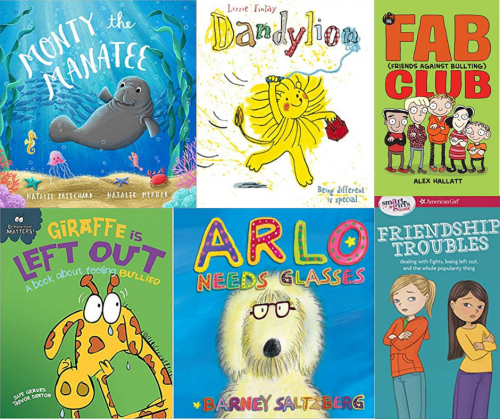I was quite badly bullied at school and that kind of thing stays with you. Attitudes towards bullying seem to have changed in recent years, I think most schools have anti bullying policies and can take things a little more seriously than they did in my day. At my son’s school they’ve been doing a lot of activities around anti bullying week; so we’ve picked out six books about bullying to read this week (and every week, because this stuff is important)!

Six Books about Bullying
FAB (Friends Against Bullying) Club (FAB Club Book 1) by Alex Hallatt. This is an action-packed chapter book for 8-12 year kids who want to stand up to bullying. This is an inspiring children’s book about standing up to bullies and forming new friendships. FAB is full of humour, and has a gripping plot which teaches kids how to solve problems together.
Arlo Needs Glasses by Barney Saltzberg. One out of every five school children need glasses. This a really fun picture book for children, you can read an eye chart, look through a fold-out phoropter (that big machine optometrists use), and try on different pairs of glasses – movie star glasses, superhero glasses, mad scientist glasses and find the right pair of glasses for you. Once Arlo find some glasses which suit him, he’s back to enjoying all his favourite things again. This is a really positive book and ideal for children who are learning to love their own spectacles!
Giraffe Is Left Out – A book about feeling bullied by Sue Graves and Trevor Dunton. When Leopard arrives at Jungle School, Giraffe doesn’t want to include him and tries to exclude him from joining in. So when Leopard has a birthday party he doesn’t invite Giraffe, even though he has invited all his friends. Slowly Giraffe begins to understand how Leopard must have felt when he started school. Can the two of them learn to become friends after all?
Dandylion by Lizzie Finlay. Dandylion is one of my favourite children’s books ever! It’s all about being different and learning to accept difference in other people. When the ‘delightfully different, bright yellow and rather scruffy’ Dandylion joins Miss Gardener’s neat and tidy class, chaos and fun follow. But after one messy incident too many he’s told to go home – he just doesn’t fit in. It doesn’t take long, however, for everyone to realise that too much neatness and order isn’t always a good thing and everyone’s desperate for Dandylion to return!
A Smart Girl’s Guide: Friendship Troubles: Dealing with Fights, Being Left Out, and the Whole Popularity Thing (Smart Girl’s Guide To…) by Patti Kelley Criswell. This guide will help girls deal with the pitfalls of interpersonal relationships, from backstabbing and triangles, to other tough friendship problems. It features fun quizzes, practical tips, and stories from real girls who’ve been there – and are still friends. It’s just a shame there’s not a version for boys too!
Monty the Manatee by Natalie Pritchard. Monty the manatee is nervous about his first day at Sea School. He tries to make new friends but the other sea creatures think he’s a bit slow and strange. They’re really mean to him and call him names, but when his class is invaded by a dangerous predator can Monty save the day? Monty the Manatee is a simple book about kindness and friendships, suitable for pre-schoolers and children in KS1.
Do you have any favourite books on this subject?
If you enjoyed this, you might also like our round up of books about starting school!


